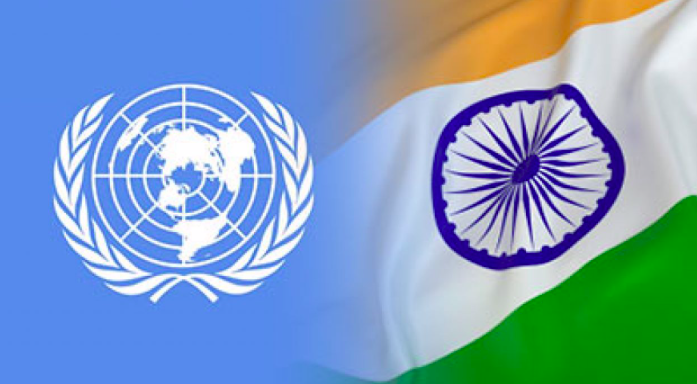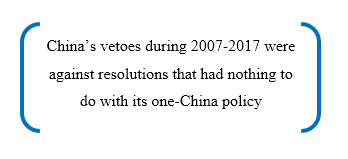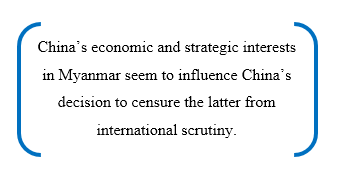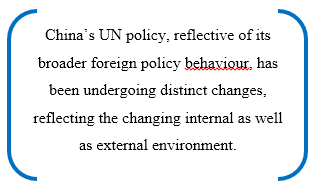Chandam Thareima, Research Intern, ICS

In almost 50 years since the People’s Republic of China’s accession into the United Nations on 25 October 1971, there have been a series of shifts in its role as a permanent member of the UN Security Council. From a cautious beginning as a newcomer to the game of UN multilateralism (1971-1978), to one of pragmatic engagement and steady integration with the global economy in pursuit of modernization (1979-1989), China has sought, in the post-Tiananmen incident period, to salvage its international image while continuing its modernization drive (1990-2000), before assuming an increasingly pro-active stance at the turn of the new century. Especially since 2008, the Chinese role became increasingly wide-ranging in its strategic scope and reach as well as more assertive and strident. One important indicator of this is China’s voting pattern in the Council. The period 1971-2000, may be depicted largely as “going with the flow” or “passive” approach except in extraordinary circumstances. During this entire period, China cast its veto only four times – twice in 1972 and one each in 1997 and 1999. For the most part, its votes were affirmative, non-participative and abstentions, as illustrated below. This was to change decisively in the following two decades.
| Time period | Affirmative votes percentage | Non-Participation | Abstentions | Vetoes |
| 1971-1978 | 54.9 % | 47 | 4 | 2 |
| 1979-1989 | 93.5% | 17 | 1 | 0 |
| 1990-2000 | 87.9% | 0 | 43 | 2 |
Source: United Nations Security Council Documents: Volumes of Resolutions and Decisions
China’s first veto in 1972 was against a resolution for Bangladesh’s membership in the UN, on behalf of its regional ally Pakistan; and the other 1972-veto was on an amendment to a NAM (Non-Aligned Movement)-sponsored resolution against Israeli use of force in the Middle East. This veto was not very substantial considering it was on an amendment rather than a resolution but could be inferred as showing solidarity to NAM countries and opposition to the US which had vetoed the resolution. The remaining two vetoes were against resolutions on Guatemala (1997) and on Macedonia (1999). Both these vetoes were in protest against the former two countries’ recognition of Taiwan- a threat to China’s core national interests. China’s UN representative Qin Huasun explained the 1997-veto as: “The Guatemalan authorities cannot expect to have the cooperation of China in the Security Council while taking actions to infringe upon China’s sovereignty and territorial integrity”.

Since the turn of the century, China’s enhanced capabilities were translated into activism and confidence in global affairs. As Zhiqun Zhu argued, “China is gradually becoming more responsive to international demands to put diplomatic pressure on authoritarian regimes such as Sudan and North Korea”. Such confidence and cooperativeness were also reflected in its UNSC voting pattern during 2001-2006 in which its abstentions were drastically reduced to eight, increased its affirmative votes to 95.5 per cent, and a total lack of vetoes. However, the timeframe of this analysis, 2007-2017 is marked by a total of eight vetoes, a stark departure from China’s earlier record in which it had cast only four vetoes in a span of 30 years since its UN admission. It is often surmised that China’s frequent use of its vetoes in this period implied assertiveness on its part as a result of its rising power, rendering the Council ineffective in discharging its function of maintaining international peace and security. China’s assertiveness from this period onwards can also be seen in its broader foreign policy behaviour, for instance in the South China Sea.
Moreover, this period also assumes significance because unlike in the past when it traditionally used to veto resolutions on countries that impinged on its territorial integrity, China’s vetoes during 2007-2017 were against resolutions that had nothing to do with its one-China policy. Furthermore, the eight vetoes during this period were on resolutions against countries that had questionable human rights records‒ Myanmar (2007), Zimbabwe (2008) and Syria (2011, 2014, 2016, 2017 and two vetoes in 2012)— an association with which China risked tarnishing its international image which it had been striving to build since the Tiananmen incident. By not only stepping away from its consensus seeking stance on the UNSC resolutions, but also by blocking them from being adopted, China has shown that it is willing to stand against the larger consensus, in pursuance of its interests as also for the principles it upholds, and enforce it through its veto power. This marks a sharp shift from its earlier Security Council diplomacy wherein China has always refrained from using its veto power except in Taiwan-related cases or in cases in which its immediate geo-political interests were involved.

Although China defended its stance in UNSC on grounds of the principles it upholds such as respecting the sovereignty of the nations concerned, its opposition to sanctions, or the lack of consensus in the Council, China’s actions could also be attributed to its desire to protect its economic, political and strategic interests in those countries. For instance, China vetoed the 2007 UNSC Resolution calling for Myanmar to cease military attacks against civilians in ethnic minority regions and to put an end to the associated human rights and humanitarian law violations, on the grounds that “the matter was an internal affair of a sovereign state and did not pose a threat to international or regional peace and security”. However, China’s economic and strategic interests in Myanmar also seem to influence China’s decision to censure the latter from international scrutiny.
Most of China’s vetoes coincided with Russia’s, implying that both these countries support one another when their respective national interests are at stake and to avoid taking an isolationist stance. This could be seen in the cases of Libya and Syria when both these nations concurrently abstained or vetoed. China is also increasingly seen to shadow its vetoes and abstentions behind Russian vetoes or abstentions. During 2013-2017, China’s vetoes (3) and abstentions (14) were all on resolutions against which Russia had vetoed or abstained. This helped China diminish the negative attention of international community’s disapproval as Russia’s concurrent vetoes or abstentions insulated China’s own.

Furthermore, China’s reduction of vetoes from five to three, and of its affirmative votes from 98.8 per cent to 97.7 per cent, increase of abstentions from five to 15 from the period 2007-2012 to the period 2013-2017; its exercise of vetoes and abstentions largely in support of Russian vetoes and abstentions, and not entirely to protect its own interests, could very well be interpreted as an act of cautiousness in the UN. This cautiousness could be seen as a tactical response to the international community’s apprehensions about China’s assertiveness. Nevertheless, the period 2007-2017 was also marked by an increasing number of UNSC Resolutions having been adopted without any apparent opposition from China. Thus, the argument that it was creating obstacles in the functioning of the Security Council is not entirely true.
From the foregoing account, it could be inferred that China’s UN policy, reflective of its broader foreign policy behaviour, has been undergoing distinct changes, reflecting the changing internal as well as external environment. Overall, it must be noted that in both the phases – 2007 to 2012 and 2013 to 2017- although China exercised its veto power, it nevertheless maintained a high rate of affirmative voting affinity with the rest of the Council members. This is enormously significant, especially in view of the fact that China has, on balance, maintained a posture of collaboration with the other powers in UNSC matters rather than a contentious one. This in turn provides some pointers to understand China’s foreign policy behaviour in the backdrop of its growing power.



















